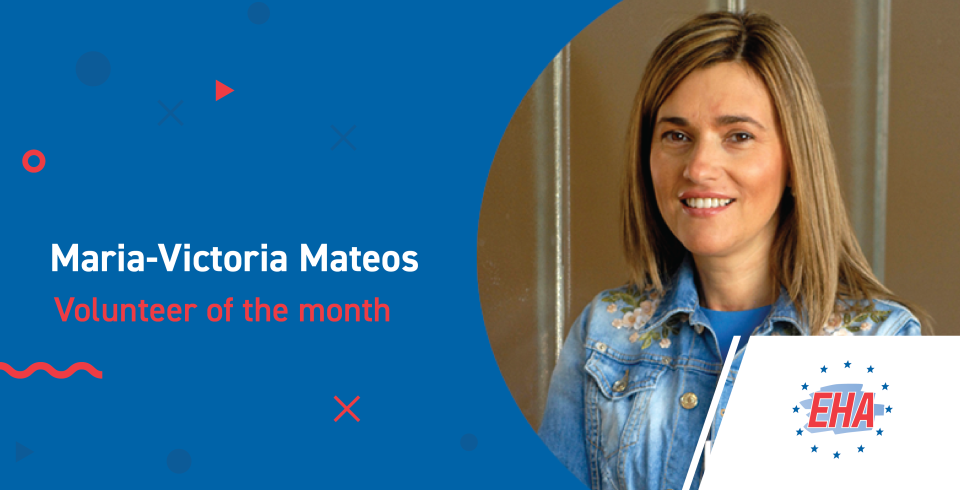This information originally appeared on the previous EHA website. Links to other pages may be inactive.

Maria Victoria Mateos currently heads the Scientific Program Committee of the 24th EHA Congress which will be held on June 13-16 in Amsterdam. She started volunteering for EHA in 2013 and is still an EHA Volunteer under the mentorship of Prof Jordi Sierra and current EHA President Prof Pieter Sonneveld.
Why did she become a volunteer and what keeps her going? Read more.
- What do you currently do for EHA and when did you start?
One of my current roles at EHA, maybe the one at which I am much more focused now is being the Chair of the Scientific Committee for the 24th EHA Congress that will take place in Amsterdam on June 13-16. This represents the summit of one of my first relationships with the EHA.
In 2012, Prof Jordi Sierra invited me to take part in the Advisory Board of the Scientific Program Committee for the 18th EHA Congress in Stockholm in June 2013. That was the starting point. I served one additional year as part of the Advisory Board and subsequently as part of the Scientific Program Committee for two additional years. I was out of the organization in 2017 and joined again in the Scientific Program Committee in 2018 to be the chair of the EHA Congress in 2019.
Apart from my SPC work, I was also elected as Councilor for the EHA Board for a period of 4 years. I had to rotate off this year but was elected again as part of the Executive Board of the EHA which I will serve the next three years.
I have been part of several committees of EHA as well and my role as Training and Program Director of the Clinical Research Training in Hematology program is worth mentioning because it was an exciting two years for me.
- How did you become a volunteer? Who helped/encouraged you to become one?
Professor Jordi Sierra was the first person who invited and introduced me to EHA. I really enjoyed it and I can remember very well what I thought after my first contact with EHA: the excellent organization, the kind people and I learned a lot about the organization of the Annual Congress. I was proud of my first and little contribution that will culminate this year with the role of Chair of the SPC. The other person who is key to my role as EHA volunteer is Pieter Sonneveld, current President of EHA. Both of us share myeloma as our field of expertise in hematology. He was my main mentor at EHA to be nominated as Councilor for the Board.
- What is your motivation on volunteering for EHA?
EHA promotes excellence in patient care, research, and education in hematology. This is what I’ve seen at EHA over all these years, which I consider crucial for all hematologists. In addition, EHA also promotes hematology research and education across the world, by organizing activities in less-developed countries. It is amazing to bring the latest advances to all hematologists. EHA’s commitment to different national societies is great and the meetings organized together with other societies are of great value and always very well-evaluated.
- Why did you choose to serve EHA?
EHA is the society who represents us, European hematologists and to serve EHA as part of the Advisory Board of the SPC first, and finally, chair of the SPC and part of the Executive Board means that my election was ideal.
- What does volunteering for EHA give you/do to you?
EHA has given me much more than what I have contributed. I have been given the opportunity to learn a lot at EHA, the European community and umbrella of all different national societies of hematology where I have established networks with hematologists worldwide as well as meeting kind and excellent people. EHA has given me more friends around the world.
- What would you say to others who would like to volunteer for EHA as well?
EHA is our European association and all of us have to take part in it. We are EHA and you, as European hematologist, have much potential. If you are a junior researcher involved in clinical trials or basic/translational research, there are the Clinical Research and Translational Research Training Hematology programs. If you want to be certified as a hematologist according to the European Hematology Curriculum, you can take part in the European Hematology Exam or in the EHA Campus and be part of the EHA learning community. If you are interested in any of the committees or have innovative ideas, ask the EHA office on how you can contribute and remember: all of us are EHA.
EHA is a Public Benefit Organization under Dutch law. This means that at least 90% of our efforts are focused on the general good, and profits generated from our activities are solely invested in projects and programs for the benefit of the hematology community. It also means that volunteers are driving our programs and do not receive any salary or financial compensation. These volunteers range from board members to committee members, case writers, external reviewers. Altogether they work for ‘the good cause’ by sharing their knowledge and experience in the broad range of projects and programs EHA is doing. All aimed at lifting hematology to the next level.